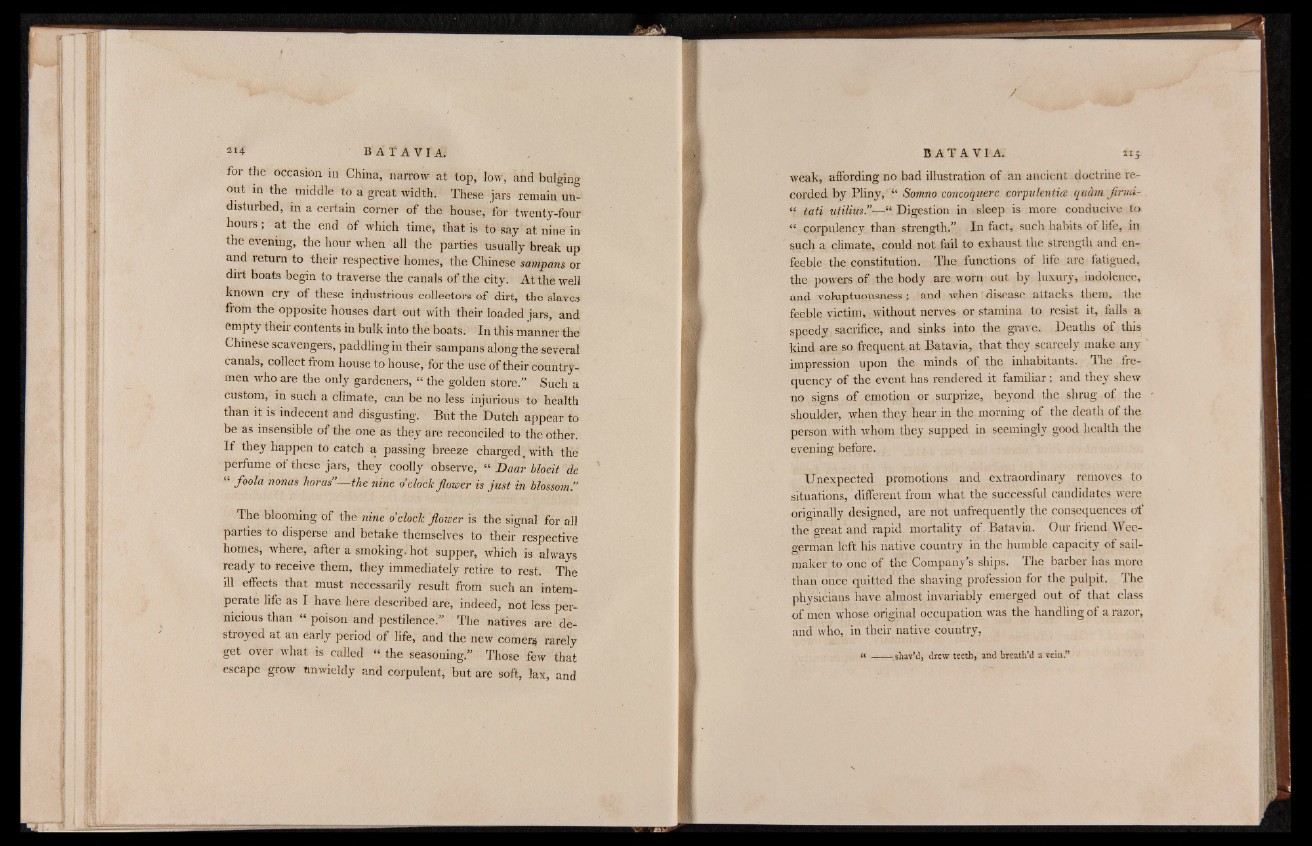
for the occasion in China, narrow at top, low, and bulging
out in the middle to a great width. These jars remain undisturbed,
in a certain corner of the house, for twenty-four
hours; at the end of which time, that is to say at nine in
the evening, the hour when all the parties usually break up
and return to their respective homes, the Chinese sampans or
dirt boats begin to traverse the canals of the city. At the well
known cry of these industrious collectors of dirt, the slaves
from the opposite houses dart out with their loaded jars, and
empty their contents in bulk into the boats. In this manner the
Chinese scavengers, paddling in their sampans along the several
canals, collect from house to house, for the use of their countrymen
who are the only gardeners, “ the golden store/' Such a
custom, in such a climate, can be no less injurious to health
than it is indecent and disgusting. But the Dutch appear to
be as insensible of the one as they are reconciled to the other.
I f they happen to catch a passing breeze charged, with the
perfume of these jars, they coolly observe, “ Daar bloeit de
“ foola nonas horas”— the nine o’clock flower is just in blossom.’’
The blooming of the nine o’clock flower is the signal for all
parties to disperse and betake themselves to their respective
homes, where, after a smoking, hot supper, which is always
ready to receive them, they immediately retire to rest. The
ill effects that must necessarily result from such an intemperate
life as I have here described are, indeed, not less pernicious
than “ poison and pestilence." The natives are destroyed
at an early period of life, and the new com erg rarely
get over what is called “ the seasoning." Those few that
escape grow unwieldy and corpulent, but are soft, lax, and
/
weak, affording no bad illustration of an ancient doctrine recorded
by Pliny, “ Somno concoquere corpulentia quam flrmi-
| tati utilius.”—“ Digestion in sleep is more conducive to
S corpulency than strength." In fact, such habits of life, in
such a climate, could not fail to exhaust the strength and enfeeble
the constitution. The. functions of life are fatigued,
the powers of the body are worn out by luxury, indolence,
and voluptuousness; and when disease attacks them, the
feeble victim, without nerves or stamina to resist it, falls a
speedy sacrifice, and sinks into the grave. Deaths of this
kind are .so frequent at Batavia, that they scarcely make any
impression upon the minds of the inhabitants. The frequency
of the event has rendered it familiar; and they shew
no signs of emotion or surprize, beyond the shrug of the
shoulder, when they hear in the morning of the death of the
person with whom they supped in seemingly good health the
evening before.
Unexpected promotions and extraordinary removes to
situations, different from what the successful candidates were
originally designed, are not unfrequently the consequences of
the great and rapid mortality of Batavia. Our friend Wee-
german left his native country in the humble capacity of sail-
maker to one of the Company’s ships. The barber has more
than once quitted the shaving profession for the pulpit. The
physicians have almost invariably emerged out of that class
of men whose original occupation was the handling of a razor,
and who, in their native country,
« shav’d, drew teeth, and breath’d a vein.”